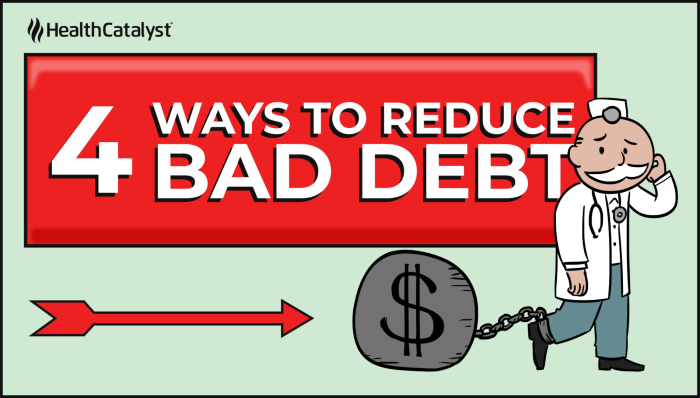Navigating the treacherous waters of bad debt can be daunting, but fear not, as this guide is here to shed light on the path to financial security. With tips and strategies delivered in an American high school hip style, this narrative promises to be both informative and entertaining.
As we delve deeper into the intricacies of managing finances and credit, you’ll discover the keys to steering clear of the pitfalls of bad debt.
Understand the Concept of Bad Debt
Bad debt is money that is borrowed and not repaid on time or in full, leading to financial problems. This type of debt usually comes with high-interest rates and can negatively impact credit scores.
On the other hand, good debt is money borrowed for investments that have the potential to increase in value over time, such as student loans or mortgages. Good debt can help build wealth and improve financial stability.
Consequences of Bad Debt on Personal Finances
When individuals accumulate bad debt, they face various consequences that can significantly impact their financial health:
- High-interest payments: Bad debt often comes with high-interest rates, leading to increased total repayment amounts.
- Damage to credit score: Failure to repay debt on time can result in a lower credit score, making it harder to borrow money in the future.
- Legal actions: In severe cases, creditors may take legal action to recover the debt, resulting in court judgments or wage garnishments.
- Stress and anxiety: Dealing with bad debt can cause emotional distress and affect overall well-being.
Budgeting and Financial Planning
Budgeting and financial planning are essential tools in managing your finances effectively and avoiding bad debt. By creating a budget and having a solid financial plan in place, you can better control your spending, save for the future, and avoid falling into debt traps.
Creating a Budget
Creating a budget involves outlining your income and expenses to determine how much money you have coming in and where it is going. Here are some tips for creating a budget to avoid accumulating bad debt:
- Start by listing all your sources of income, including your salary, bonuses, and any other earnings.
- Next, make a list of all your expenses, including fixed costs like rent, utilities, and loan payments, as well as variable costs like groceries, dining out, and entertainment.
- Differentiate between needs and wants to prioritize essential expenses and cut back on unnecessary spending.
- Set realistic spending limits for each category and track your expenses regularly to ensure you stay within your budget.
- Consider using budgeting tools or apps to help you monitor your finances and make adjustments as needed.
Importance of Financial Planning
Financial planning goes beyond budgeting and involves setting long-term financial goals, saving for emergencies, and investing for the future. Here’s why financial planning is crucial in preventing bad debt:
- Having a financial plan allows you to set specific goals and work towards achieving them, whether it’s buying a home, saving for retirement, or starting a business.
- By establishing an emergency fund, you can cover unexpected expenses without relying on credit cards or loans, reducing the risk of accumulating debt.
- Investing wisely can help you grow your wealth over time and build a secure financial future, minimizing the need for borrowing money in times of need.
- Regularly reviewing and adjusting your financial plan ensures that you stay on track to meet your goals and avoid financial pitfalls that could lead to bad debt.
Credit Management

To manage credit cards responsibly and prevent bad debt, it is crucial to understand how credit works and its impact on your financial health. By being aware of your credit score and spending habits, you can avoid falling into debt traps.
Impact of Credit Scores
Credit scores play a significant role in determining your ability to accumulate debt. A higher credit score indicates that you are a responsible borrower, making it easier for you to access credit at favorable terms. On the other hand, a low credit score can result in higher interest rates and limited borrowing options.
It is essential to monitor your credit score regularly and take steps to improve it if needed.
Emergency Savings and Contingency Plans
Having an emergency savings fund and a solid contingency plan are crucial aspects of financial planning to avoid falling into bad debt when unexpected situations arise.
Building an Emergency Fund
One effective strategy for building an emergency fund is to set aside a portion of your income each month specifically for this purpose. Aim to save at least three to six months’ worth of living expenses to cover any unforeseen events such as medical emergencies, car repairs, or job loss.
- Automate your savings by setting up automatic transfers from your checking account to a separate savings account dedicated to emergencies.
- Cut back on non-essential expenses to free up more money for your emergency fund.
- Consider depositing windfalls like tax refunds or bonuses directly into your emergency savings account.
Importance of Contingency Plans
Having a contingency plan in place can provide peace of mind and financial security when facing unexpected financial challenges.
Remember, failing to plan is planning to fail. A well-thought-out contingency plan can help you navigate through tough times without resorting to borrowing money at high interest rates.
- Identify possible financial risks such as job loss, major repairs, or medical emergencies, and brainstorm solutions for each scenario.
- Explore insurance options like health insurance, disability insurance, or home insurance to mitigate potential financial losses.
- Regularly review and update your contingency plan to ensure it remains relevant to your current situation.